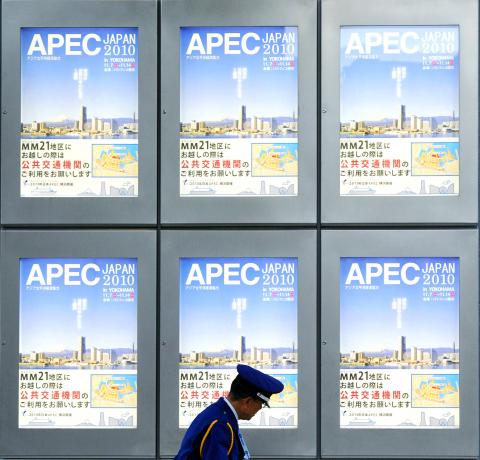Former vice president Lien Chan (連戰) yesterday said that Taiwan had been invited to join the Trans-Pacific Partnership (TPP), a major initiative seeking to create a Free Trade Area of the Asia-Pacific (FTAAP). However, his assertion seemed to conflict with remarks by a trade official later in the day.
Lien made the remark at a press conference before he leaves tomorrow for the APEC Economic Leaders’ Meeting this weekend in Yokohama, Japan, to represent President Ma Ying-jeou (馬英九).
Taiwanese presidents are not allowed to attend the summit because of Chinese opposition.

Photo: CNA
“The Republic of China ... has been supportive of the establishment of an FTAAP as a long-term goal. We have been reminded of the need — in fact we’ve been invited — to enhance our participation [in pursuing regional economic integration] under the TPP framework,” Lien said.
This marked the first mention of Taiwan’s involvement in the TPP, which has received strong endorsement from the US, as it seeks to increase its engagement within the region.
A Bureau of Foreign Trade official later added a few caveats to Lien’s comments on Taiwan’s participation in the body.
“[Our participation is] not to the extent that we have been invited or are able to participate in the TPP, but that we have expressed our interest in the TPP to its member countries on various occasions,” bureau Deputy Director-General Chang Chun-fu (張俊福) told the Taipei Times by telephone.
Chang said some TPP member states contacted by Taiwan had offered ideas as to how Taipei could obtain a better understanding of the organization.
The TPP, a free-trade agreement originally consisting of New Zealand, Singapore, Chile and Brunei that entered into force in May 2006, and ASEAN Plus Three (the ASEAN states as well as Japan, South Korea and China) are looked upon as the potential key regional approaches to an FTAAP.
Malaysia last month became the ninth member of the TPP, which also includes Australia, Peru, the US and Vietnam, among others, while Japan is considering joining.
“Not only Taiwan, but many APEC members became intrigued by the TPP after the US decided to join the negotiations in 2008,” Chang said, adding that Taiwan had yet to express its preferences in terms of routes into an FTAAP.
During this weekend’s summit, APEC members will review the possible avenues for achieving an FTAAP, including the TPP and ASEAN Plus Three.
“Due to the lack of progress in the Doha Round of global market-opening talks, APEC now has an opportunity to move toward an FTAAP,” Lien said.
Lien said Taiwan would keep a close eye on developments surrounding the FTAAP, especially under a TPP framework.
“Whether Japan will join a TPP is still unknown ... If some consensus is reached after countries exchange ideas at the summit, we expect more countries will join the TPP,” Lien said.
Lien also said he would use the occasion to discuss with Chinese President Hu Jintao (胡錦濤), who will also attend the summit, issues related to the Economic Cooperation Framework Agreement (ECFA) and how to shape Taiwan’s economic future.

Alain Robert, known as the "French Spider-Man," praised Alex Honnold as exceptionally well-prepared after the US climber completed a free solo ascent of Taipei 101 yesterday. Robert said Honnold's ascent of the 508m-tall skyscraper in just more than one-and-a-half hours without using safety ropes or equipment was a remarkable achievement. "This is my life," he said in an interview conducted in French, adding that he liked the feeling of being "on the edge of danger." The 63-year-old Frenchman climbed Taipei 101 using ropes in December 2004, taking about four hours to reach the top. On a one-to-10 scale of difficulty, Robert said Taipei 101

Nipah virus infection is to be officially listed as a category 5 notifiable infectious disease in Taiwan in March, while clinical treatment guidelines are being formulated, the Centers for Disease Control (CDC) said yesterday. With Nipah infections being reported in other countries and considering its relatively high fatality rate, the centers on Jan. 16 announced that it would be listed as a notifiable infectious disease to bolster the nation’s systematic early warning system and increase public awareness, the CDC said. Bangladesh reported four fatal cases last year in separate districts, with three linked to raw date palm sap consumption, CDC Epidemic Intelligence

US climber Alex Honnold left Taiwan this morning a day after completing a free-solo ascent of Taipei 101, a feat that drew cheers from onlookers and gained widespread international attention. Honnold yesterday scaled the 101-story skyscraper without a rope or safety harness. The climb — the highest urban free-solo ascent ever attempted — took just more than 90 minutes and was streamed live on Netflix. It was covered by major international news outlets including CNN, the New York Times, the Guardian and the Wall Street Journal. As Honnold prepared to leave Taiwan today, he attracted a crowd when he and his wife, Sanni,

Two Taiwanese prosecutors were questioned by Chinese security personnel at their hotel during a trip to China’s Henan Province this month, the Mainland Affairs Council (MAC) said yesterday. The officers had personal information on the prosecutors, including “when they were assigned to their posts, their work locations and job titles,” MAC Deputy Minister and spokesman Liang Wen-chieh (梁文傑) said. On top of asking about their agencies and positions, the officers also questioned the prosecutors about the Cross-Strait Joint Crime-Fighting and Judicial Mutual Assistance Agreement, a pact that serves as the framework for Taiwan-China cooperation on combating crime and providing judicial assistance, Liang